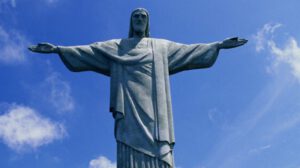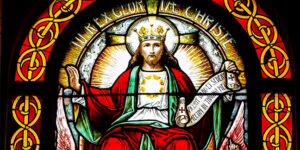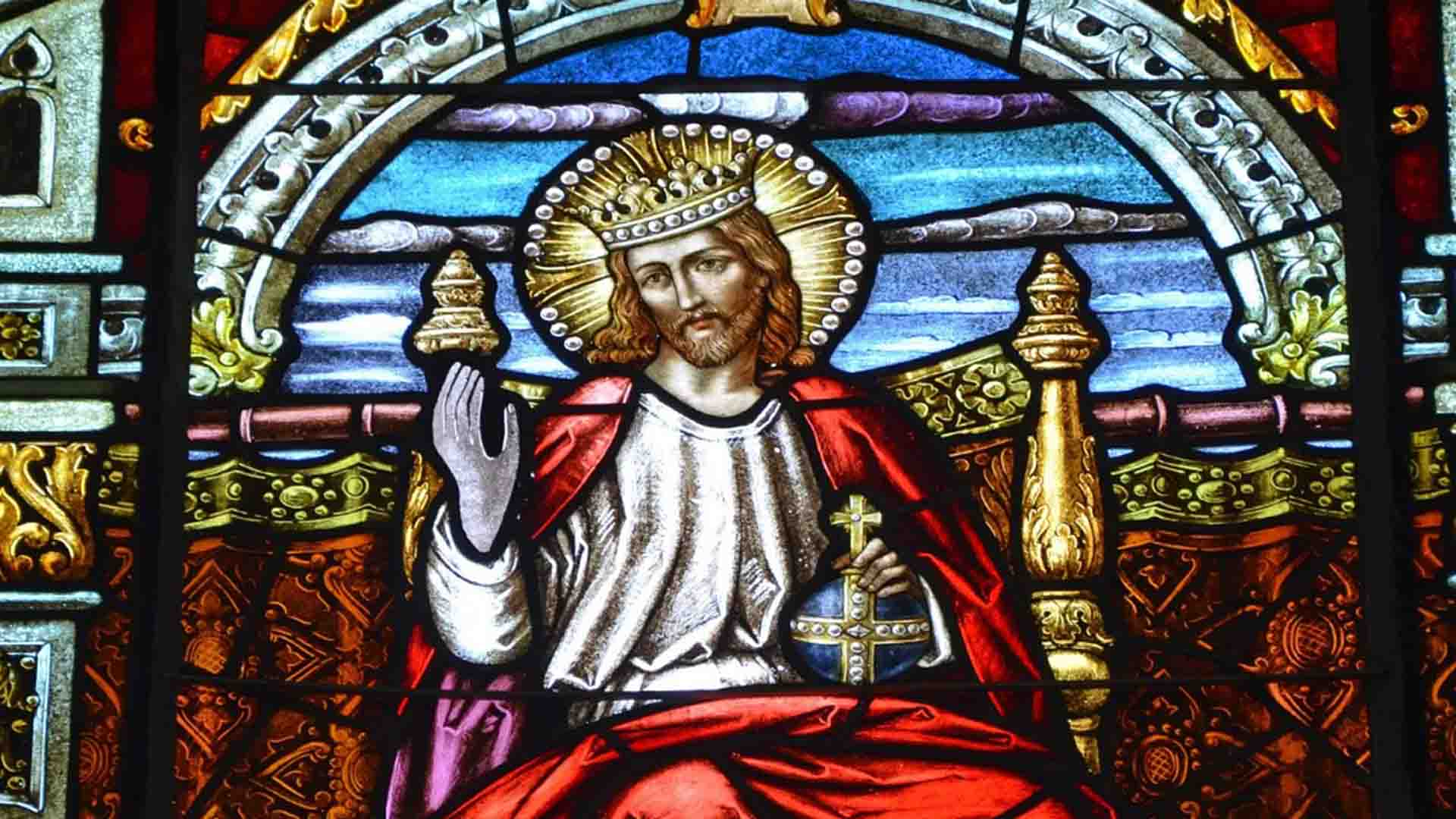Thy Kingdom Come!
Today is the culmination of the liturgical year, a special day to reaffirm our faith and trust in Our Lord Jesus Christ as the King of the Universe. This Solemnity, which, according to the older liturgical calendar, used to be observed on the last Sunday of the month of October, preceding the Feast of All Saints, is now held on the Sunday immediately prior to the first Sunday of Advent.
The day’s readings are a clear endorsement of the Kingship of Our Lord. In the background to the First Reading (2 Sam 5: 1-3) lies the story of Saul, the first king of Israel, who lost to the Philistines, an enemy tribe. Given his ineptitude, God guided the Prophet Samuel to David, a humble but talented musician, who was secretly anointed king. While Saul was still living, David settled in Hebron where he was accepted by the tribe of the southern kingdom of Judah and reigned as their king for seven years.
After Saul died, the northern tribes who had been under Saul came to David at Hebron and anointed him King of all of Israel. Hebron, a Palestinian city thirty kilometres from Bethlehem, is one of the oldest cities in the Levant (a geographical area comprising Lebanon, Jordan, Palestine, Israel and Syria) and now in the focus of the Israeli-Palestinian conflict.
David reigned for forty years, from his capital Jerusalem, until he died at 70 years of age. He had already chosen his son Solomon for his successor, after whose death Israel was no longer a united kingdom. As for David, he is still honoured as an ideal king and the earthly forefather of our Lord and Saviour Jesus Christ, who by His Cross willed to unite all the peoples of the world.

Equally apt for the great Feast of the Kingship of Christ is that passage of St. Paul’s Epistle (Col. 1: 11-20) that reminds us Christians that God has “qualified us to share in the inheritance of the saints in light” and “transferred us to the kingdom of His beloved Son, in whom we have redemption, the forgiveness of our sins.” Jesus is the Alpha and the Omega, through whom and for whom all things were created, “whether thrones or dominions or principalities or authorities”. Jesus made peace “by the blood of his cross”, and “in Him all things hold together.”
The Gospel text (Lk 23: 35-43) points to the striking contrast between Our Lord’s Passion and His final Victory. He died not because he deserved to die; He chose to die as a sacrificial lamb for our salvation. Not realising this, the soldiers mocked at him, saying, “If you are the King of the Jews, save yourself!” Jesus had clarified that His kingdom was not of this earth; and although the inscription ‘Iesus Nazarenus Rex Iudaeorum’ (‘Jesus of Nazareth, King of the Jews’) was meant to be ironic, it went down in history as the real truth. It reflected the conviction that Jesus was indeed the Messiah that they were waiting for – although this school of thought was anathema to the establishment.
There is no doubt, however, that both Jewish tradition and public opinion had unwittingly endorsed the true and complete kingly identity of Jesus. But what did He mean by ‘Kingdom’, as in the remarkable words ‘Thy Kingdom come’ from the Lord’s Prayer? In his book Jesus of Nazareth, Pope Emeritus Benedict XVI writes: “The Kingdom is not a thing, it is not a geographical dominion like worldly kingdoms. It is a person; it is He.”
The Lord’s Kingdom is indeed a spiritual kingdom that has the minds and hearts of the whole of humankind for its domain; but this mystical dimension has its consequence in civil society too. In fact, it is here that we Christians must practise the Beatitudes to the fullest extent, and proclaim the Gospel to the ends of the world, ensuring that our earthly journey becomes a fulfilment of God’s will – the will of His Son, Jesus Christ, King and Lord of the Universe.
Why a Feast of the Kingship of Christ?
There are only a few monarchies left in the world, but the concept is not incompatible with human nature. In the Christian tradition, the monarchical idea goes back to the days when, by God’s command and public acclamation, Samuel anointed Saul as king of Israel (c. 1021-1000 B.C.). Later, on finding him inept, he appointed David, who became king of the whole of Israel whose tribes he united after Saul’s death.
Monarchies were the most common form of government worldwide until the last century. However, in his encyclical Quas Primas (1925), it is not the form of government that Pope Pius XI brings into focus; it is the concurrent worldview that he finds problematic. Writing in the aftermath of World War I, when some key monarchies had been replaced by republics, the Pontiff pointed to a king “of whose kingdom there shall be no end.” (n. 5) Decrying the growing secularisation of society, he made it clear that, “as long as individuals and states refused to submit to the rule of our Saviour, there would be no really hopeful prospect of a lasting peace among nations.”
The issue of the encyclical marked the sixteenth centenary of the Council of Nicaea, where the divinity of the Word Incarnate—the foundation of Christ’s empire over humankind—was properly defined. The commemorative Encyclical proclaimed “Pax Christi in regno Christi” (“The peace of Christ in the kingdom of Christ”).
Biblical endorsement
Quas Primas notes that “it has long been a common custom to give to Christ the metaphorical title of ‘King’, because of the high degree of perfection whereby He excels all creatures.” But the Pope is also quick to clarify that “the title and the power of King belongs to Christ as man in the strict and proper sense too. For it is only as man that He may be said to have received from the Father ‘power and glory and a kingdom,’ since the Word of God, as consubstantial with the Father, has all things in common with Him, and therefore has necessarily supreme and absolute dominion over all things created.” (n. 7)
There are several Biblical references to Christ as King, one of them being Psalm 72, which foretells that his kingdom will have no limits and will be enriched with justice and peace: "in his days shall justice spring up, and abundance of peace... And he shall rule from sea to sea, and from the river unto the ends of the earth." (n. 8). The Prophets, too, give abundant testimony.[1] The doctrine of the Kingship of Christ found in the Old Testament is “even more clearly taught and confirmed in the New”. For instance, St Luke speaks of the Archangel announcing to the Blessed Virgin that she should bear a Son; that "the Lord God shall give unto him the throne of David his father, and he shall reign in the house of Jacob for ever; and of his kingdom there shall be no end."[2] (n. 10)
Finally, Christ Himself speaks of his kingly authority.[3] So, it goes without saying that “the Catholic Church, which is the kingdom of Christ on earth, destined to be spread among all men and all nations, should with every token of veneration salute her Author and Founder in her annual liturgy as King and Lord, and as King of Kings.” (n. 12)
King, Kingship, Kingdom
To those unconvinced of the need to call Our Lord ‘King’, St. Cyril of Alexandria explains how “Christ has dominion over all creatures, a dominion not seized by violence nor usurped, but his by essence and by nature.”[4] The Pope says Christ’s kingship is “founded upon the ineffable hypostatic union. From this it follows not only that Christ is to be adored by angels and men, but that to him as man angels and men are subject, and must recognize his empire; by reason of the hypostatic union Christ has power over all creatures. But a thought that must give us even greater joy and consolation is this that Christ is our King by acquired, as well as by natural right, for he is our Redeemer. Would that they who forget what they have cost their Saviour might recall the words: ‘You were not redeemed with corruptible things, but with the precious blood of Christ, as of a lamb unspotted and undefiled.’[5] We are no longer our own property, for Christ has purchased us ‘with a great price’;[6] our very bodies are the ‘members of Christ’[7].” (n. 13)

But what is the nature and meaning of Christ’s Kingship and His Kingdom?
Christ’s Kingship comprises a threefold power: legislative, executive and judicial. Christ, our Redeemer, is also a law-giver, to whom obedience is due;[8] those who keep his laws show their love for Him and shall remain in his love.[9] “Executive power, too, belongs to Christ, for all must obey his commands; none may escape them, nor the sanctions he has imposed.” He claimed judicial power as received from his Father[10], in which is included the right of rewarding and punishing all men living, for this right is inseparable from that of judging. (n. 14)
Yet, Christ’s kingdom is not earthly; it is spiritual and is concerned with spiritual things. “On many occasions, when the Jews and even the Apostles wrongly supposed that the Messiah would restore the liberties and the kingdom of Israel, he repelled and denied such a suggestion.” (n. 17) That is not to say that Christ has no place in in private affairs or in politics. Says the Pope: “It would be a grave error, on the other hand, to say that Christ has no authority whatever in civil affairs, since, by virtue of the absolute empire over all creatures committed to him by the Father, all things are in his power. Nevertheless, during his life on earth he refrained from the exercise of such authority, and although he himself disdained to possess or to care for earthly goods, he did not, nor does he today, interfere with those who possess them.” (n. 17)
All nations and all peoples are subject to Jesus Christ, the Universal King. In his earlier encyclical, Urbi Arcano (1921), Pope Pius XI decried the world’s folly in the following words: “With God and Jesus Christ excluded from political life, with authority derived not from God but from man, the very basis of that authority has been taken away, because the chief reason of the distinction between ruler and subject has been eliminated. The result is that human society is tottering to its fall, because it has no longer a secure and solid foundation.”
Lamenting that as long as the rule of our Saviour was repudiated, there would be no lasting peace in society. “If, therefore, the rulers of nations wish to preserve their authority, to promote and increase the prosperity of their countries, they will not neglect the public duty of reverence and obedience to the rule of Christ.” (n. 18)
Rationale
Pointing out that, historically, feasts have been instituted one after another “according as the needs or the advantage of the people of Christ seemed to demand”, Pope Pius XI implored our Divine King’s blessings. “That these blessings may be abundant and lasting in Christian society, it is necessary that the kingship of our Saviour should be as widely as possible recognized and understood, and to the end nothing would serve better than the institution of a special feast in honour of the Kingship of Christ. For people are instructed in the truths of faith, and brought to appreciate the inner joys of religion far more effectually by the annual celebration of our sacred mysteries than by any official pronouncement of the teaching of the Church. Such pronouncements usually reach only a few and the more learned among the faithful; feasts reach them all; the former speak but once, the latter speak every year – in fact, forever. The Church's teaching affects the mind primarily; her feasts affect both mind and heart, and have a salutary effect upon the whole of man's nature. Man is composed of body and soul, and he needs these external festivities so that the sacred rites, in all their beauty and variety, may stimulate him to drink more deeply of the fountain of God's teaching, that he may make it a part of himself, and use it with profit for his spiritual life.” (n. 21)
However, we need not wait for the Feast to venerate and adore Christ the King. We ought to seek Him through the year, under the Sacramental species, through public adoration of the Blessed Sacrament exposed, and through solemn processions (cf. n. 26). The Feast of the Kingship of Christ sets the crowning glory upon the mysteries of His life commemorated throughout the year.
[1] Isaiah (9: 6-7); Jeremiah (13: 5); Daniel (2: 44; 7: 13-14), and Zachary (9: 9)
[2] 1: 32-33
[3] Cf. Mt 25: 31-40; Jn 18: 37; Mt 28: 18; Apoc. 1: 5, 19: 16; Heb. 1: 2; 1Cor 15: 25
[4] Cf. n. 13
[5] 1 Pet. 1: 18-19
[6] 1 Cor. 6: 20
[7] 1 Cor. 6: 15
[8] Cf. Council of Trent, session VI, can. 21
[9] Cf. Jn 14: 15; 15: 10
[10] When the Jews accused him of breaking the Sabbath by the miraculous cure of a sick man. (Cf. Jn 5: 22)

